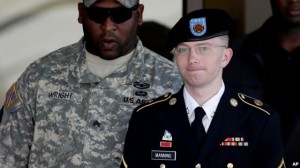Day 1 courtroom notes: Bradley Manning’s motions hearing, October 17, 2012
Bradley Manning returned to Ft. Meade today for another motions hearing. Judge Lind will rule tomorrow on the defense motion to compel witnesses in the next hearing and on whether an author made Collateral Murder’s contents public at least a year before Bradley’s arrest.
By Nathan Fuller. October 17, 2012.

AP photo of PFC Bradley Manning
Developments since last hearing in August:
To start today’s motion hearing for PFC Bradley Manning, Judge Denise Lind recapped for the press and public what has taken place since court was last in session. 1) After reviewing the approximately 700 Quantico emails that the prosecution had tried to hold back from the Defense, Lind ruled against the prosecution, finding all but 12 were relevant. 2) On September 28, Lind largely granted the government’s redactions and substitutions for DHS, Department of State, and CIA documents. 3) Before litigating the defense’s speedy trial motion, the parties need to agree on a chronology of relevant events thus far. The prosecution sent the defense a 231-page document, which was rejected because it was a non-searchable PDF, mostly consisting of extraneous content. Continuing their strategy of ongoing delay, the prosecution then sent a 20-page Word document still containing irrelevant information, which the defense will be forced to review and whittle down into an appropriate timeline.
The prosecution refuses to provide an accurate portrayal of the pretrial timeline, because, as Coombs noted in his motion, the prosecution’s repeated and unjustifiable delays point “unmistakably to the conclusion that PFC Manning’s statutory and constitutional speedy trial rights have been trampled upon with impunity.”
Innocent until proven guilty: could others have been responsible?
A major issue today was David Finkel’s 2009 book The Good Soldiers, which the defense says includes verbatim transcript excerpts of the ‘Collateral Murder’ video. The government doesn’t believe the court should recognize that the transcripts are “verbatim” and doesn’t believe they definitively prove that Finkel was in possession of the video before its 2010 release. Judge Lind will compare the video and the book excerpts and rule tomorrow on whether she’ll take judicial notice of Finkel writing a “verbatim” transcript.
On the defense’s motion to compel witnesses, Lind will rule tomorrow when the court resumes at 1:00pm EST. The witness testimony requested would give more background on the prosecution’s extensive and potentially illegal pretrial delays.
Prosecution continues to block evidence showing lack of harm.
Fearing that evidence be introduced showing Bradley Manning to be a whistleblower deserving judicial protection, the prosecution continued its attempts to gag all references to the lack of harm caused, particularly a defense list of statements made by government officials. These include comments by the Defense Department’s Geoff Morrell, a White House press release, letters between Defense Secretary Robert Gates and Senator Carl Levin, a Defense Department briefing, a State Department briefing, Andrea Mitchell’s interview of Joe Biden, and a transcript of Congressman John Conyers speaking to the House of Representatives on the beneficial effects of WikiLeaks’ releases.
The government initially rejected most of these items because the defense submitted a number of news articles citing the quotes at issue, calling the news stories “hearsay” that didn’t directly reflect the government’s positions. But since Coombs has now provided the government briefs themselves, the prosecution opposes the majority of the statements on relevancy grounds. The prosecution’s Captain Morrow appeared to take issue with a CNN article as opposed to a newspaper article (such as from the New York Times), because the CNN post appeared on the Internet instead of in print.
The only reason the government wants to suppress these already-public statements, Coombs contends, is to obscure the fact that the whistleblower who released these cables to WikiLeaks brought no harm to U.S. national security.









Justice delayed is justice denied–Interpreted from the Magna Carta, Article 40 (also attributed to Wm. Gladstone).
–R.T. Thomes (Amsterdam)
One of the most egregious indictments of the military is, of course, the mistreatment (read torture) of Bradley Manning during his 10 months in solitary confinement at Quantico,VA. But most shocking of all: the U.N. Special Rapporteur on Torture, Juan Mendez, was repeatedly denied access to Manning during that time. Nonetheless, after a 14 month investigation, Mendeza found Manning’s treatment to be “cruel, inhuman and degrading punishment”, in violation of both the 5th & 8th amendments of the U.S. Constitution
When State Department spokesman Crowley (on 3/11/12) called Manning’s prison treatment “ridiculous, counter-productive and stupid”, he was immediately forced to resign.
On a positive note however, on 4/11/12, 295 academics (mostly Americans) signed a letter stating that Manning’s treatment violated the 8th amendment (“cruel and unusual punishment”) as well as the 5th Amendment, which prohibits punishment without trial.
I’ve noticed that the U.S.government/Military ignores anything coming from the U.N. when it is not in its own interests. Ditto even our own laws and Constitution (not to mention International Law) which are bypassed with impunity when they get in the way of our government’s objectives. Our own leaders, up to the highest level, have rendered “the Rule of Law” a joke.